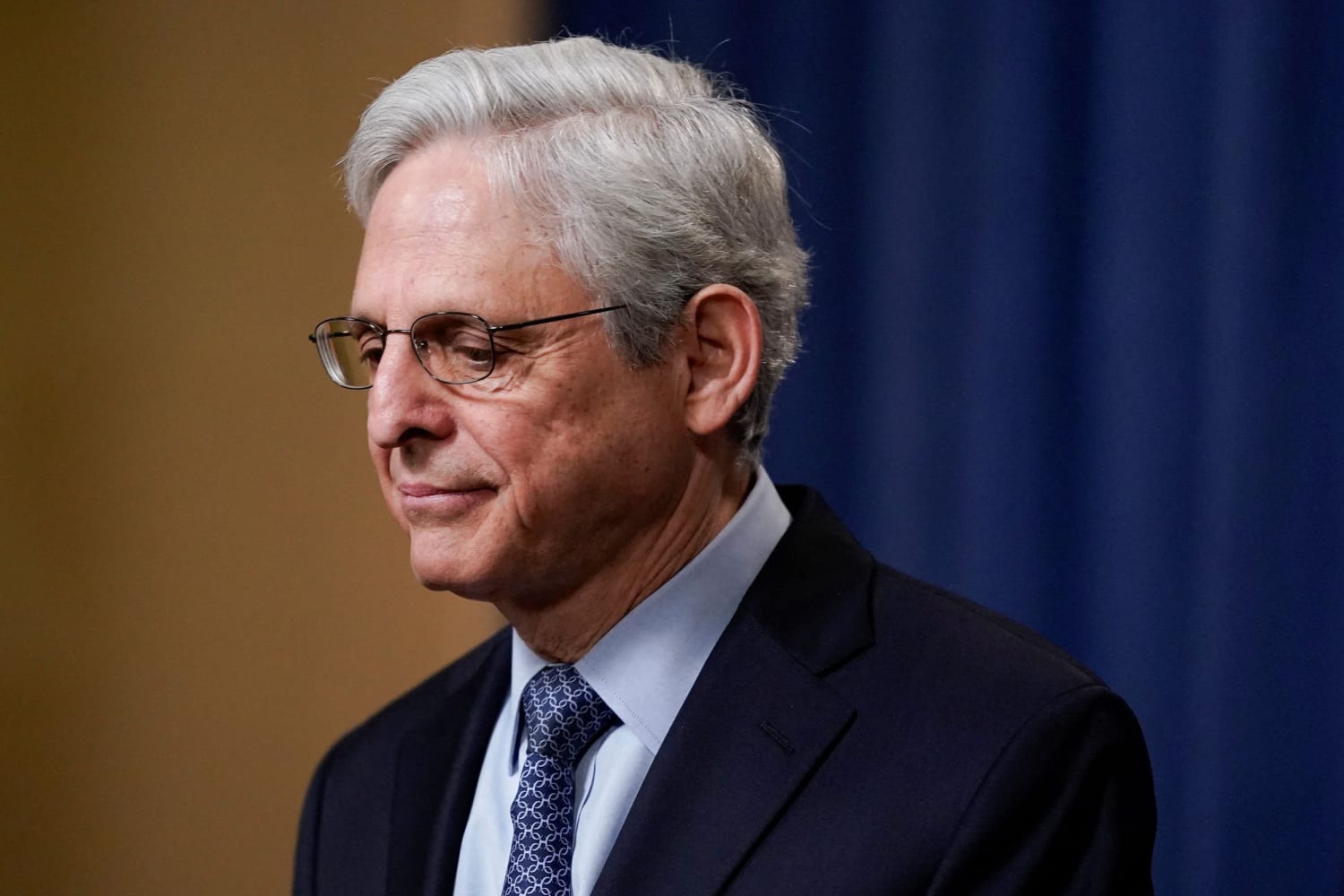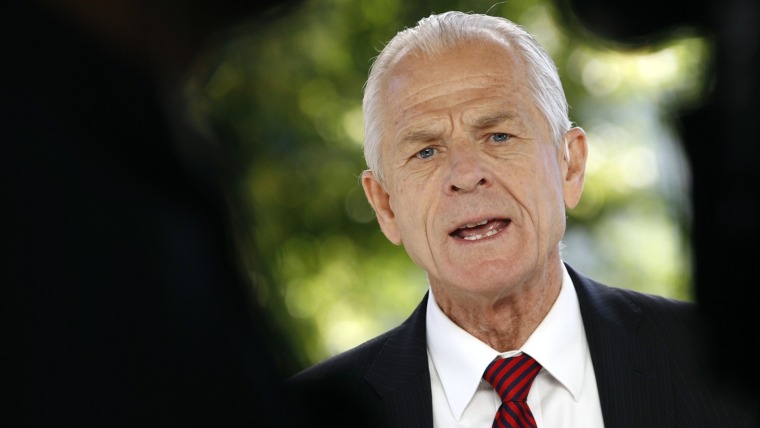The House of Representatives on Wednesday held two more Donald Trump loyalists in contempt of the Jan. 6 committee’s investigation into the attack on the U.S. Capitol, but the congressional effort to discover the facts is being thwarted by an overly cautious Justice Department.
By a vote of 220-203, the House held Peter K. Navarro, Trump’s trade adviser, and Dan Scavino Jr., who was responsible for Trump’s social media strategy, in criminal contempt of Congress for stonewalling the Jan. 6 committee’s subpoenas. But that vote will be a futile gesture if the Justice Department refuses to prosecute Navarro and Scavino.
The timidity of Attorney General Merrick Garland has already undermined the committee’s ability to obtain the evidence of a key witness.
That’s not an idle concern. The timidity of Attorney General Merrick Garland has already undermined the committee’s ability to obtain the evidence of a key witness, former White House chief of staff Mark Meadows. More than 110 days ago, the House held Meadows in contempt of Congress and urged Garland to prosecute him criminally for interfering with its investigation.
Nothing has happened. Rather than aiding the congressional inquiry, the Justice Department seems to be missing in action. With the possibility that the Republicans will gain control of the House in the midterm elections, Garland’s delay may already be fatal. In November Garland indicted Steve Bannon, who pleaded not guilty, for contempt of Congress. Bannon’s trial is now set for July — eight months later, despite the prosecutors’ request for an April trial date.
If a Meadows’ indictment today had a comparable timeline, the trial would occur after the November elections. Many Republicans have signaled that if the party wins control of the House in November, the Jan. 6 committee investigation, as we know it, will cease.
Congressional frustration with Garland’s dilly-dallying has spilled out publicly. His procrastination earned well-deserved reproach by the committee last week when it voted to refer contempt charges for Navarro and Scavino to the House “The Department of Justice has a duty to act on this referral and others that we have sent,” said Rep. Adam Schiff, D-Calif. “Without enforcement of its lawful process, Congress ceases to be a co-equal branch of government.” Rep. Elaine Luria, D-Va, was blunter: “Attorney General Garland, do your job so we can do ours.” The Justice Department’s inertia may embolden other Trump loyalists to defy Congress. With Meadows seemingly avoiding responsibility for shirking his obligation, other recalcitrant witnesses may fear no consequences for defying the Jan. 6 investigators.
The Justice Department’s inertia may embolden other Trump loyalists to defy Congress.
According to the committee’s report justifying the contempt resolution, Navarro “worked with Steve K. Bannon and others to develop and implement a plan to delay Congress’s certification, and ultimately change the outcome” of President Joe Biden’s election. The report also alleged that Scavino “worked with President Trump as part of the then-President’s campaign to reverse the election results. This campaign included, among other things, spreading false information via social media …”
Meadows’ role appears even more pivotal. As Trump’s chief of staff, he was a clearinghouse for communications about Trump’s efforts to overturn Biden’s election, as well as during the hours when rioters were storming the Capitol.
He cooperated initially. That’s why the Jan. 6 committee has so many of his text messages and emails about illegitimate efforts to block the peaceful transition of power, as well as contemporaneous reactions to the insurrectionists attempting to impede the congressional certification of Biden’s victory.
But then Meadows backtracked, withdrawing his cooperation and refusing to testify, claiming that executive privilege justified his actions. Committee member Rep. Adam Kinzinger, R-Ill., has expressed doubts that Meadows even produced all relevant emails when he was purporting to honor the committee’s subpoena.
Like Meadows, Navarro and Scavino have advanced flimsy claims of executive privilege, also claimed by Trump, to justify their noncompliance. Rep. Jamie Raskin, D-Md., has characterized Navarro’s privilege claim as “dubious.” Rep. Liz Cheney, R-Wyo., one of two Republicans on the Jan. 6 Committee (Kinzinger is the other), stressed Wednesday that Navarro and Savino “cannot simply refuse to respond” to the committee’s subpoena, but must appear and assert any claimed privilege. And the Biden administration has also already undercut Scavino’s and Navarro’s privilege claims by explicitly waiving them.
In January, Meadows chose to ride the coattails of Trump’s legal argument to the Supreme Court that executive privilege — which the Biden White House had disclaimed — barred the National Archives from producing Trump White House documents to the Jan. 6 committee. In urging the court to accept Trump’s appeal and rule promptly, Meadows’ attorney George J. Terwilliger III argued in an amicus filing that a court ruling upholding Trump’s executive privilege claim also would mandate a narrowing or withdrawal of the subpoena to Meadows. The court subsequently rejected Trump’s National Archives executive privilege claim, 8-1, without deciding if a former president can ever assert executive privilege when the incumbent president waives it.
While the ruling did not address Meadows’ claim of privilege, the outcome weakens his purported justification to defy the committee. Cheney has warned Garland not to be dissuaded by Meadows’ privilege claim. Last week, during the referral vote, she argued that prosecutors should “not apply any doctrine of immunity that might block Congress from fully uncovering and addressing the causes of the January 6th attack.”
Meadows sat at the center of the storm on Jan. 6, receiving text messages that day from members of Congress while the Capitol was under siege by rioters. Donald Trump Jr. texted Meadows during the siege urging him to tell his father to condemn the riot. Fox News hosts also texted Meadows during the Capitol riot urging Trump to tell the rioters to leave. Meadows must be required to testify about how he responded to these urgent pleas during the crucial hours that the Capitol was under siege, including any communications he had with Trump. And, most importantly, what Trump did or didn’t do, in response.
Meadows may also be able to shed light on another Jan. 6 mystery — a more than 7-hour gap in Trump’s legally required telephone call records on that day. With his proximity to Trump, he has relevant evidence about what really happened in the White House that fateful day.
Faced with a criminal trial and potential conviction, Meadows, Navarro or Scavino may conclude that providing truthful testimony and responsive documents is preferable to taking a fall to protect those responsible for the Capitol riot. But that will only happen if Garland’s Justice Department, in the words of Luria, does its job.
Meadows’ text messages and other White House documents will only be fully understood if he is required to testify not only about these communications, but what he did in response. Our democracy demands nothing less.
Source: | This article originally belongs to Nbcnews.com










